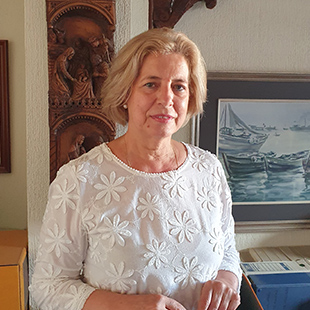On November 19 and 20, the 10th St. Josemaría Symposium will take place at the Jaén Conference Center. Two days of debate and reflection on freedom in today's world, with a special focus on young people.
The Symposium, organized by the Catalina Mir Foundation, a non-profit organization that promotes welfare and guidance activities in favor of the family and young people, will count among its speakers the participation of the former Minister of the Interior, Jaime Mayor Oreja, the Professor of State Ecclesiastical Law at the Complutense University and collaborator of Omnes, Rafael Palomino or Teresa and Antonio, an engaged couple who speak naturally of their Christian life in networks.
Maria Buenoone of its organizers, has granted an interview to Omnes on the occasion of this Congress.
- Why was the theme of Freedom and Commitment chosen for the 10th St. Josemaría Symposium?
The aim of the St. Josemaría Symposium is none other than to make known his message, his teachings. And if there are some themes that St. Josemaría was passionate about, it was personal freedom, his own and that of others, and commitment and dedication. He spent a lot of time speaking and writing about them. To give just one example, in his book "Friends of God," which contains some of his homilies, there is one entitled "Freedom, a gift of God," in which he says forcefully, "I would like to engrave in each one of us: freedom and dedication are not contradictory; they mutually sustain each other.
The importance of this clear message of St. Josemaría is so great, and so vital for the person and society of today, that it seemed to us of great interest to dedicate this Symposium to deepening and reflecting on the theme.
- Is freedom hijacked by ideology in today's world?
I would not say as much as kidnapped, but very limited. Freedom is very strong, and at the same time very sensitive and suffers from any attack. And since ideologies usually have a reductionist background, they imprison decisions, taking away the freshness of freedom, which naturally tends to be loose.
Today it is striking the force of political correctness, which sometimes forces a hard exercise of maturity and reflection in making many decisions, which we are not always willing to make.
It even goes so far that a decision taken against the majority criterion prevailing in society is considered an attack on it. Today it is considered revolutionary not the one who wants to transform society by adapting it to his preconceptions, but the one who, against the dominant ideology, does not renounce to defend his own convictions, no matter how old-fashioned the majority of society may consider them. Look, for example, if it does not seem revolutionary today to go against abortion!
However, speaking the truth, speaking coherently and living as we think leads us to be freer every day, and the opposite coerces us.
- Do you think that, as some thinkers have said, we have fallen into the slavery of the "simple conquest" of freedoms that basically bind us, such as the choice of sex, interruption of pregnancy, etc.?

Sometimes we do not understand that the true meaning of freedom does not lie in "doing whatever I want" at all times, but in knowing well and choosing well what makes us better people, and what brings us closer to our fulfillment. In this sense, having the freedom to do more things does not necessarily make us freer. And this is the case of these conquests falsely qualified as freedoms, which, when confronted squarely with human nature itself, end up limiting the possibilities of personal development and, therefore, true freedom.
- During Covid there is a lot of talk about the lack of freedoms or the use of the pandemic to restrict individual freedoms, do you think there has been that backlash?
Your question is highlighting the topicality of the Symposium's theme.
Individual freedom is a fundamental aspect of the individual that has been under constant attack since time immemorial and in all periods of history, and this pandemic situation that we are living through is no exception.
The Symposium will address different aspects of freedom, and will present testimonies of people who have lived and are living their personal freedom in a committed way, and with a radical commitment, also in these circumstances, and in some cases, precisely because of these difficult circumstances we have gone through.
Therefore, I would like to invite your readers to participate in the Symposium, directly, and if that is not possible, telematically, as it will surely make us reflect on these important issues in our lives.
- Does commitment expand freedom or limit it?
It seems that in our time, commitment and freedom are antagonistic concepts, that it is difficult to conceive the word freedom within a concept of commitment.
However, it is curious that freedom can be conceived without commitment, when every day, to some extent, we commit ourselves to something, to a lifestyle, to a career, to a partner, to a sport..., even when we have to choose, and we don't, we are already choosing.
Freedom can be understood as a set of apparent benefits, of total independence, of not being tied to anything or anyone, of not having to account for words or actions, etc., and commitment, as a perpetual chain, which does not allow changes or progress, but, on the contrary, fixes our feet on a stone that stops us in our tracks.
On the contrary, I believe that to commit oneself to something, we must first educate ourselves, know the possibilities we have within our reach to carry it out, make knowledge an intelligent way of comparison, and once the reasons for our decision are clear, we will be able to fulfill our commitments freely, and our commitment will always be free, even if sometimes it is difficult for us to carry it out.
St. Josemaría, in Friends of God, wrote: "Nothing is more false than to oppose freedom to surrender, because surrender comes as a consequence of freedom".
- In the program there is a section dedicated to young people who are accused of shying away from commitment - do you want to show another face of youth?
Indeed, if we watch the news and listen to the news, it seems that young people only think about parties and drinking binges. But that is only a part of the youth.
However, there is another kind of youth, fortunately the majority, although it is less in the news, who are willing to commit themselves daily to the defense of very different causes, such as social, environmental, political or religious issues. The St. Josemaría Symposium, in addition to showing the world another face of youth, aims to present to young people, through people of their own age, exciting projects that they can make their own lives, and for which it is worthwhile to commit oneself freely.
- Do you think that today's young people have, however, greater freedom to express or live their beliefs and convictions?
It is evident that young people have great freedom to express and live according to their convictions, and that they have a great capacity for commitment.
A very concrete example is a HARAMBEE project, which they called KAZUCA, which started from the young people in the VIII edition of the Symposium, in 2016. Young Andalusians and Africans came together for education in Africa. They set out to raise funds to provide scholarships for the university studies of two young people without resources, who excelled in their studies, Violet and Jeff, from the slum Kibera, a very poor neighborhood of Nairobi. It was a dream for everyone and ... the dream has come true. Violet and Jeff have just graduated, started working and are happily raising their family and their environment. They will, in a way, be with us at this Symposium.
- What is the balance of these ten editions?
Very positive. Throughout these editions a wide variety of topics have been addressed, and thousands of people have been shown the teachings of St. Josemaría on each of these subjects. Many speakers have passed through Jaén, all of them of great stature, who have enlightened us on the subjects of teaching, the family, the role of Christians in society in the 21st century, communication, service, dialogue... On these subjects, life testimonies have been presented, which have helped us to have a better perspective of the world around us, literary novelties have been presented on the figure of St. Josemaría.... All this has meant that our Symposium, which was born small but with a vocation to grow, is becoming more important with each edition, and is now considered "international," reaching more and more people every day.
- What are the prospects for the future?
Throughout his life, St. Josemaría dealt in depth with many topics that are still very topical today and that this Symposium intends to continue to make known.
In addition to the people who have participated in person in the sessions, in the last editions we have reached, through internet connections, all the corners of the world. From now on, with more experience and more means in this type of participation, due to the circumstances of the pandemic we are all aware of, we are very excited that our Symposium will serve as a loudspeaker so that the message of St. Josemaría reaches every corner of the world.





 Marriage and the family in the thought of St. Josemaría
Marriage and the family in the thought of St. Josemaría





